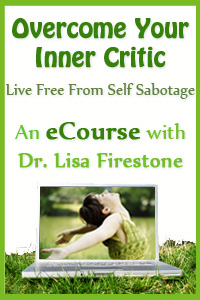Watch a Whiteboard Video on The Critical Inner Voice
What is the Critical Inner Voice?
The critical inner voice can be thought of as the language of the defensive process. It has been defined as an integrated system of thoughts and attitudes, antithetical toward self and hostile toward others that is at the core of an individual’s maladaptive behavior. The concept of the “voice” is not restricted to cognitive processes but is generally associated with varying degrees of anger and sadness. The term “voice” is used to describe a form of intrapsychic communication that represents a split within the individual between forces that are life-affirming and those that are antagonistic to the self .“Listening” to the voice, that is, believing its prescriptions and prohibitions leads to self-limiting behavior and negative consequences. In other words, people often make their actions correspond to their self-attacks. See Video Clip.
Being for Yourself or Against Yourself
All of us are divided within ourselves. On the one hand, we have self-regard–we have traits and behaviors that we like or feel comfortable with. We have natural tendencies to grow and develop and to pursue our personal and vocational goals, as well as desires to be close in our relationships and to search for meaning in life. These qualities all make up who we really are; they reflect an undefended part of our personality and a friendly, compassionate view of our self.
The positive part of us consists of our unique characteristics–physical abilities and attributes, and emotional temperament, as well as positive traits that we naturally incorporated from our parents. It first develops and grows as a result of our parents’ and other concerned adults’ nurturing qualities and behaviors, and the love and care they direct toward us. Then it is further influenced by what we learn, what we enjoy, and the experiences that facilitate our personal growth.
The Critical Inner Voice
The Critical Inner Voice is the part of us that is turned against ourselves. It is the defended, negative side of our personality that is opposed to our ongoing development. The voice consists of the negative thoughts, beliefs and attitudes that oppose our best interests and diminish our self-esteem. It encourages and strongly influences self-defeating and self-destructive behavior. This hostile, judgmental advisor also warns us about other people, promoting angry and cynical attitudes toward others and creating a negative, pessimistic picture of the world.
The critical inner voice exists to varying degrees in every person. It undermines our ability to interpret events realistically; it triggers negative moods and sabotages our pursuit of satisfaction and meaning in life. These destructive internalized thoughts lead to a sense of alienation–a feeling of being removed from ourselves and distant from those we love. The critical inner voice is not an auditory hallucination; it is experienced as thoughts within your head. If we “listen” to its destructive point of view and believe what it is telling us, we will fail to challenge it and instead we will act on it. This process has a seriously negative consequence on our lives.
Although most of us are conscious of some aspects of this inner voice, many of our negative thoughts exist on an unconscious level. At times, we may recognize what our critical inner voice is telling us, while at other times, we may be unclear about our negative thinking and simply accept it as being true. We are often unaware of the destructive impact that these thoughts are having on our emotions, actions, and the overall quality of our lives.
The Critical Inner Voice is Not a Conscience
The critical inner voice is not a conscience or a moral guide. What most distinguishes the inner voice from a conscience is its degrading, punishing quality. Its demeaning tone tends to increase our feelings of self-hatred instead of motivating us to change undesirable actions in a constructive manner.
Challenging your Critical Inner Voice
You can take power over your critical inner voice. When you become conscious of what it is telling you, you can stop it from running your life. The challenge is to identify and ‘flush out’ this internal covert operation. To do this, be on the lookout for when you slip into a bad mood or become upset. Investigate: what caused the shift? What happened and, most importantly, what did you start telling yourself after the event? The fact that your mood shifted from feeling optimistic or relaxed to feeling down or irritable is probably a sign that you are interpreting the event through your critical inner voice.
Now that you have identified that your critical inner voice is advising you, what is it trying to get you to do? When you pinpoint the actions that it is advocating, you can take control over your critical inner voice. You can consciously decide to take action against its directives, thereby acting in your own interest.
Staying on the Right Side of Yourself and Not Listening to Your Critical Inner Voice
The balance between our two different sides is delicate and can be easily tipped. However, we don’t need to be the victims of our moods as they tip back and forth between our positive and negative feelings about ourselves. By identifying the critical inner voice and the role it plays in supporting our negative self-image, we can take action against it and significantly change our lives. We can reject attitudes that oppose our best interests and diminish our self-esteem. We can stop self-defeating and self-destructive behavior. We cannot tolerate angry, cynical attitudes toward others that turn us against people.
As you emancipate yourself from your critical inner voice, you will be free to engage in your pursuit of satisfaction and meaning in life. You will feel at peace with yourself and close to those you love. You will enjoy a compassionate view of the world and an optimistic outlook on life.


 What is the Critical Inner Voice?
What is the Critical Inner Voice?